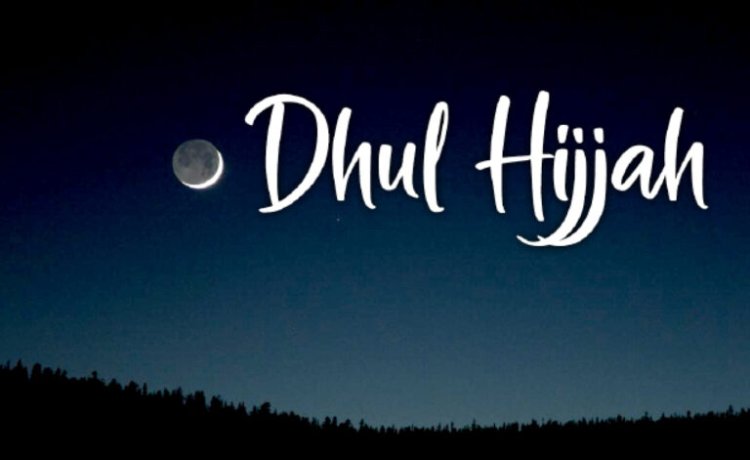The Virtues Of Dhul Hijjah, Eidul Kabir
Dhul-Hijjah, is the twelfth and last month in the Islamic lunar calendar. It is the month during which pilgrimage to Makkah (Hajj),...

Dhul-Hijjah, is the twelfth and last month in the Islamic lunar calendar. It is the month during which pilgrimage to Makkah (Hajj), which is the fifth pillar of Islam, is performed. It is on the tenth day of the same month that Muslims offer animal sacrifices to mark Eidul Kabir. Indeed, Dhul-Hijjah is one of the sacred months mentioned in Qur’an 2: 217; a month during which war is prohibited. Already, today is the sixth day of Dhul Hijjah, 1443AH. The Sultan of Sokoto and President of the Nigerian Supreme Council for Islamic Affairs (NSCIA), Alhaji Muhammad Saad Abubakar, had earlier declared Monday June 19, 2023 as the first day of the month.
The first ten days of Dhul-Hijjah is a virtuous season. It is reported on the authority of Ibn Abbas (RA) that the Prophet (SAW) said “No days are as virtuous and beloved to Allah in the observance of righteous deeds such as these days (i.e., the first ten days of Dhul-Hijjah)”. Having just few days of this season to go, let us take full advantage of them by sacrificing parts of our interests, comforts or possessions for the sake of Allah (SWT) in these first ten days of Dhul-Hijjah. We could sacrifice a portion of the night (when sleep is most desirous) to stand in prayers; worshipping Allah. We could also sacrifice some morsels of our delicious meals(s) to satisfy someone else’s hunger. The credit is ours if, during this holy season, we increase the rate of our recitation of the holy Qur’an. Ibn Abbas (RA) explains that the verse in Qur’an 22:28 “…And celebrate the name of Allah through the days appointed” refers to the first ten days of Dhul-Hijjah.
On the cutting of hair or nails during the first ten days of Dhul-Hijjah, Imam Muslim reports that the Prophet (SAW) said, “If one of you intends to sacrifice an animal on the day of Eidul Ad-ha, then he/she should not cut the hair and the nails (until after offering the sacrifice on the Eid day)”. However, scholars opine that it is not haram (forbidden) to cut the hair or nails if necessities arise. Observing this Sunnah helps believers to achieve greater reward as their hair and nails will be counted as good deeds along with the hair of their sacrificial animal.
Wednesday June 28, 2023 would be Big Sallah when Muslims shall offer animal sacrifices to commemorate the initial sacrifice offered by Prophet Ibrahim, Alayhi Salaam (AS). The Sunnah of the Prophet (SAW) requires that persons who are able to offer animal sacrifices on the occasion of the Eid should eat out of the meat and also give some portions to others. While some scholars recommend two-third (2/3) of the entire meat as the portion to be given out, others opine that the fixed proportion is not mandatory.
The most important thing is for the person who made the sacrifice to (along with his family members) eat out of it and also give part of it to relations, friends and neighbours. If cooking the fresh meat would be a burden to the recipient(s), it is preferred that the fresh meat is roasted, fried or cooked before it is shared to them. It should not be the quantity of the meat available for consumption that should matter to us, but the reward due to those who offer the sacrifice (Dahiyyyah). Indeed, slaughtering a goat on the occasion of Eidul Kabir is more rewarding than slaughtering a cow or even a camel. It is not permitted to sell anything out of the slaughter-animal; not even the hide of the animal.
The hard times in the country should not compel us to purchase under-age animals for the sacrifice. It is required that the sacrificial ram or sheep should have attained a year or at least eight months. A goat is expected to have entered its second year. A cow should have entered its fourth year and a camel should not be less than six years of age. It is not right to use a sick, emaciated or blind (partial or full) animal that has one or other deformities for the sacrifice. The animal with a broken horn or split ear(s) should not also be used for the Dahiyyah. Maliki scholars opine that the one with a broken horn can be used if no blood gushed forth from the injury.
Believers are free to slaughter their animals within the prescribed three days (tenth, eleventh and twelfth of Dhul-Hijjah). However, the first day (tenth Dhul-Hijjah), is most preferred. The slaughtering on each of the days should be done before sunset. If for any reason (including loss of the animal intended for the sacrifice) one was unable to make the slaughtering before sunset, it is recommended that the slaughtering be postponed until the following morning.
It is recommended that the following supplication is recited after every obligatory prayer beginning from the noon (Zuhr) prayer of the Eidul Kabir day (tenth of Dhul-Hijjah) and terminating at the morning (Subhi) prayer of the fourth day of the Eid (i.e., thirteenth of Dhul-Hijjah). The supplication is “Allah Akbar, Allahu Akbar, Allahu Akbar; La ilaha ila-llah; Allahu Akbar, Allahu Akbar; Wali-llahil Hamd”; meaning “Allah is the Greatest, Allah is the Greatest, Allah is the Greatest; There is no God except Allah; Allah is the Greatest, Allah is the Greatest; All praise is due to Allah”. May Allah accept our sacrifices and supplications, amin. Happy Sallah!

















